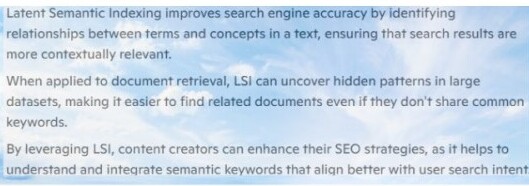
Latent Semantic Indexing is a complicated-sounding term for a technique designed to improve the way search engines understand web page content. At its core, LSI breaks down text and figures out how words relate to each other within a context instead of relying on simple keyword matches.
Let’s think of Latent Semantic Indexing (LSI) like a super-smart librarian who can figure out what a book is about even if you don’t use the exact words in the title.
Imagine This:
You walk into a library and ask for books about “puppies.”
The librarian doesn’t just look for books with the word “puppies” in the title. Instead, they also know that books about “dogs,” “canines,” or even “training pets” might be what you’re looking for. That’s because the librarian understands that these words are related.
Back in the day, search engines were quite literal. They’d scan for keywords but not much else.
Enter LSI, a type of information retrieval. LSI solves the headache of static keyword search by identifying these semantic relationships. It’s kind of like teaching a computer to read between the lines.
So, how does LSI actually work? It operates by analyzing text passages to discover relationships between terms and concepts. Imagine it as a machine tackling a jigsaw puzzle — matching pieces based on fit, not just color or pattern.
Why all the fuss about using LSI? Well, it’s about enhancing how we find info online by understanding context. This isn’t just techy mumbo-jumbo; it’s the heart of making search engines grasp meaning, not just spit out results based on word count.
Important stuff, right? A little lofty but important.
The Role of LSI in Enhancing Content Relevance and Search Engine Rankings
How does one ensure their content is a winner with the search engines?
LSI improves the relevance of content, which can significantly boost search engine rankings. The magic happens when LSI ties together phrases that relate to your main keyword, enriching the content’s value in a search engine’s eyes.
Consider LSI as the bridge connecting your content with the reader’s intent. It’s not just about matching a search query word for word. Instead, LSI tools help your content become more nuanced, catching those related phrases that paint a fuller picture.
Search engines are hungry for content that speaks their language — the language of context and relevance. LSI helps by diving deeper (pardon me) into what your content implies rather than just what it states outright. This means pages using LSI-based techniques may rank higher, as search engines evolve to favor content that provides more than superficial keyword stuffing.
To see LSI in action, let’s say you have a web page about cars. Without LSI, a query for ‘vehicle maintenance’ might miss it. With LSI, however, search engines can connect the dots, leading readers right to comprehensive content on car care, even if the exact phrase isn’t peppered throughout.
Deploying LSI is one way to stay ahead of the content game. It’s about synergizing your keyword strategy to meet the expectations of both search engines and your target audience. Utilizing LSI can transform generic mentions into meaningful discussions on a given topic, increasing the odds for better rankings and engagement.
Integrating LSI Keywords into a Successful SEO Strategy
Spotting LSI keywords might seem like a task for a super-sleuth, but it’s easier than it sounds. LSI keywords are those related terms that add depth to your content.
Start by brainstorming words associated with your primary keyword. Some handy tools can do the heavy lifting, offering up related keywords that you can sprinkle naturally throughout your text. I’m affiliated with Twinword, and it is a great free tool that helps you find LSI keywords.
Crafting content featuring these keywords shouldn’t feel like stuffing a turkey. You want a natural flow, like having a conversation with your reader. This way, the text remains engaging, not robotic. Who wants to read a piece that sounds like a bot wrote it?
Consider using LSI tools to assist. They not only suggest related terms but also help optimize your structure. Think of it as having an editor who’s got your back, ensuring the content ticks the right boxes for both engagement and SEO value.
Incorporate these keywords in ways that enhance the narrative and clarity of your writing. If the content sounds off, it’s back to the drawing board. Good use of LSI weaves your primary keyword with its relatives into a cohesive, relevant story.
Misconceptions and Future Directions of LSI
There’s a fair amount of misunderstanding when it comes to LSI keywords. Some folks might think they’re a buzzword or a silver bullet for SEO success. Not at all. LSI isn’t jamming in synonyms willy-nilly. It’s subtly, skillfully adding meaningful, relevant content.
One common myth is that LSI is synonymous with keyword density tactics of the past, where more was more. Search engines today prefer sophisticated context over mere repetition. This shift means LSI centers on semantic understanding rather than raw numerical counts.
To put it simply, you wouldn’t stuff a canine article with dog, dog, dog, dog, and dog. You would write dog, canine, tail wagging, favorite doggie chow, and pet bedding. Did a light go off?
So, why should you care about LSI? For one, search engines like Google are riding the wave of AI and machine learning. Understanding context has become more doable with these technologies. In other words, search engines are learning to read.
LSI puts your work in a good position to be seen by boosting content relevance, making your output footprints smarter, not just bigger.
Looking ahead, LSI’s future is bright. As technology advances, expect it to be an integral part of how search engines decode content. The fusion of AI with LSI suggests more intuitive search results, tailoring experiences closer to human-like understanding.
Incorporating LSI into your strategy isn’t about following a trend but preparing for an evolving web environment. As search engine algorithms get smarter, using tools and approaches that embrace this change will set you on a path to success.
Please let me know if you have any questions. I think it’s pretty straightforward, but I’m here if you want help.
Dave

Yourturnmarketing.com


Pretty! This has been a really wonderful article.
Thanks for providing this info.
Thanks a lot, pkv judi! I’m glad you like it, and you are very welcome! If there’s anything else you are curious about, please let me know.
Dave